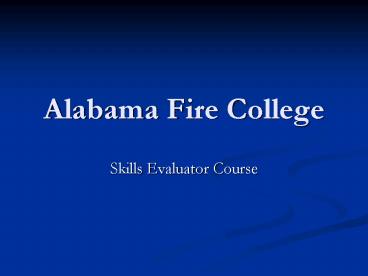Alabama Fire College - PowerPoint PPT Presentation
1 / 25
Title:
Alabama Fire College
Description:
ProBoard and IFSAC require that we have a method of ... ProBoard and IFSAC required that evaluator's have training. Alabama Fire ... Leniency error ... – PowerPoint PPT presentation
Number of Views:231
Avg rating:3.0/5.0
Title: Alabama Fire College
1
Alabama Fire College
- Skills Evaluator Course
2
Skills Testing
- ProBoard and IFSAC require that we have a method
of testing every JPR - ProBoard and IFSAC require that the evaluator of
the skills be someone other than the instructor
for that skill - ProBoard and IFSAC required that evaluators have
training
3
Alabama Fire Service Terminology
- Proctors
- Employees of Alabama Fire College who monitor
field courses - Evaluators
- Local fire department or EMS agency staff who are
trained to evaluate skills testing
4
Skills Testing
- Skill performance involves the translation of
knowledge into action - Learning is defined as a change in behavior and
skills allow a person to demonstrate that changed
behavior - REMEMBER We are teaching candidates to perform
in one of the most hazardous jobs in the world
5
ProBoard Criteria M
- M-20
- When certification testing is accomplished with
written or skills testing methodologies, the
tests may sample the candidates competencies
of a standard or level.
6
ProBoard Criteria M
- Describe the agencys policy that determines how
required skills are selected for testing,
including those skills that are required for all
certification tests.
7
The Four Roles of the Evaluator
- Observing the candidate
- Making a judgment on performance
- Documentation of the results
- Ensure fair and safe testing environment
- Fair testing procedures
- Professionalism
- Standard performance guidelines
8
Fair Testing Procedures
- Before starting ask if there are any questions
- Test the complete station
- When the test is over, advise the candidate to
return to the waiting area or staging area - DO NOT TEACH AT THE STATION
9
Fair Testing Procedures
- The testing station is a chance for the candidate
to demonstrate what they know, not a time to trip
them up
10
Evaluator Professionalism
- Respect for others
- Self-confident but not superior
- Competent
- Willing to listen
- Dresses appropriately for the work to be done
11
Concept of Skill Development
- Stages of candidate skill mastery
- Non-readiness stage
- Readiness stage
- Development stage
- Practice stage
- Demonstration stage
- Maintenance stage
12
Skill Development
- As an evaluator, what stage of the skill
development will you be grading? - Recruits
- Rescue technician refreshers (future
credentialing)
13
You as an Evaluator
- You will make judgments about a candidate based
on - Your knowledge of the skill
- The actual performance of the skill by the
candidate
14
You as an Evaluator
- You may be influenced by several factors
- Sex of the candidate
- Ethnic background
- Appearance
- Demeanor of the candidate
- His or her home department
- It was NOT done to meet your idea of how it
should be done
15
Skills Sheets
- Skill sheets are designed to limit influences
- Must compare performance to the standard
- Detailed documentation of what the candidate did
incorrectly will be invaluable in an appeals
process - Evaluate the candidate on what you observe not
what you feel about the candidate
16
Documentation
- Poor example
- Did not properly don the SCBA
- Did not properly don the SCBA while adjusting
straps - Good example
- The candidate placed the cylinder/harness on top
of their back and tightened the side straps
before attaching the two straps together at the
regulator
17
General Guidelines
- Candidates should be rated or evaluated to the
requirements on the skill sheet and not each
other. - Your evaluation should be of the candidates
performance and not on your opinion
18
Guidelines for Evaluators
- Prepare yourself before each exercise
- Do you know all the forms?
- Do you know who and how many to evaluate?
- Do you know the location?
- Do you know what skills you are evaluating?
19
Guidelines for Evaluators
- Position yourself so that you can observe the
candidate you are assigned to evaluate - Be totally acquainted with what you are testing
- Adhere to the skills directions
20
Guidelines for Evaluators
- Carefully record your observations
- Make accurate observations
- Record comments on what the individual failed to
do - Do not allow early observations to bias later
observations. - Observe with an open mind
21
Guidelines for Evaluators
- Do not form final opinions until the exercise is
completed - Never indicate to candidates during an exercise
how well or how poorly they are doing - Avoid smiling, nodding, etc.
- Candidates will be looking for clues
22
Rating Problems
- Halo error
- Central tendency error
- Leniency error
- Stereotype error
23
Summary
- Accreditation requires that the students have a
fair, safe, and equal opportunity when testing in
both the cognitive and psychomotor environment - We try to eliminate any issue or obstruction to
fair testing
24
Comments
25
Questions






























